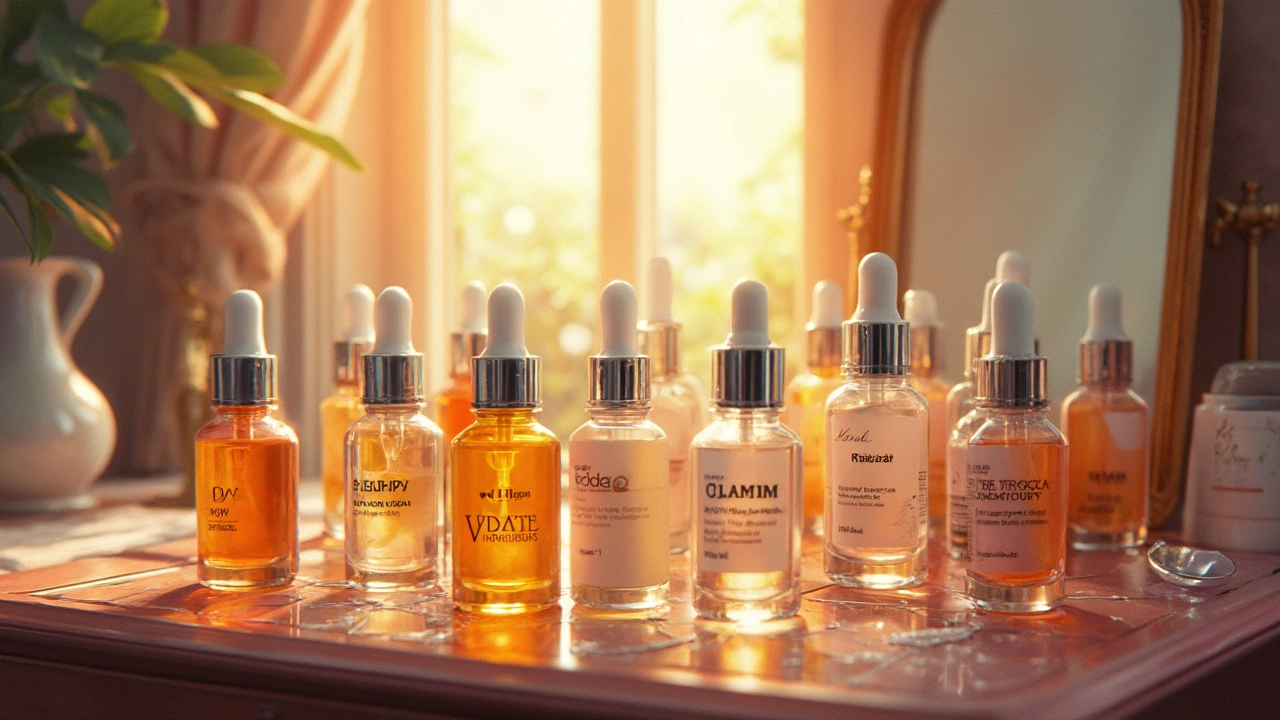Daily Face Serum: Which One Fits Your Routine?
 Mar, 5 2025
Mar, 5 2025
Ever wondered if your skin could benefit from a daily face serum? Trust me, you're not alone. It's not just about slathering on any potion you find in a pretty bottle. Serums can work wonders when chosen right.
First off, why even use a serum? Well, these little bottles of magic are packed with powerful ingredients designed to penetrate deeper than your regular moisturizers. So, if you're looking to tackle skin issues like dullness or fine lines, a serum could be your new best friend.
But before diving in, you've got to know your skin. Is it dry, oily, combination, or sensitive? This will dictate the kind of serum your skin will love. Picking the wrong one could turn out to be a bumpy ride—literally! For instance, oily skin types might benefit from serums with salicylic acid, while dry skin craves hyaluronic acid for that extra boost of hydration.
- Why Use a Face Serum?
- Know Your Skin Type
- Key Ingredients to Look Out For
- Incorporating Serum into Your Routine
- Common Mistakes to Avoid
Why Use a Face Serum?
Dive into the skincare world, and you'll quickly hear about the power of face serums. But what makes them so special, and why should they be part of your daily routine?
Imagine a product that's lightweight yet packed with high concentrations of active ingredients targeting specific skin concerns. It's this potent focus that helps serums address issues like fine lines, uneven skin tone, and even acne. Unlike moisturizers, which often sit on the skin’s surface, serums have smaller molecules that penetrate deeply, delivering nutrients directly to where they're needed most.
Better Absorption and Results
Experts suggest that serums can create significant visible improvements over time. Dr. Howard Murad, a recognized authority in the skincare industry, once said,
"Serums are the workhorses of any skin-care routine."That’s because they're designed to absorb swiftly, providing results faster than many other skincare products.
A Versatile Option for All Skin Types
No matter your skin type, there's likely a serum that can enhance your skincare journey. Oily skin? Look for a serum with salicylic acid or niacinamide. Dry skin craving moisture? Dive into one with hyaluronic acid or vitamin E.
For those skeptical of adding one more step to their skincare routine, it's worth noting that serums often boost the effectiveness of your other products. Applying your chosen serum before heavier creams ensures the active ingredients do their job beneath the occlusive layer of your moisturizer.
Time-Effective and Efficient
Despite their powerful effects, serums are straightforward to use. Just a few drops, applied to freshly cleansed skin, and you're set. Best part? They typically absorb quickly, so there's no added time to your already busy morning.
So next time you're standing in the skincare aisle, consider adding a face serum to your routine. Your skin might just thank you for it.
Know Your Skin Type
Getting to know your skin might seem like a daunting task, but it's actually pretty simple once you break it down. And trust me, it's essential for picking the right face serum that will make your skin thrive!
Oily Skin
If your face feels like a slick pancake within hours of washing, you're likely dealing with oily skin. It's caused by overactive sebaceous glands, and while the shine can be a pain, the silver lining is that oily skin tends to wrinkle less. For those battling excess oil, look for serums with ingredients like salicylic acid or niacinamide to help regulate oil production.
Dry Skin
On the flip side, does your skin feel tight? Maybe it looks flaky or dull? That's your skin crying out for moisture. Dry skin types should lean towards serums packed with hyaluronic acid or glycerin, as they boost hydration and lock it in. These ingredients draw water to the skin, giving it that fresh and lively look.
Combination Skin
This one's a bit tricky. If you're nodding yes and no to both the oily and dry descriptions, welcome to the combo club. Typically, people with combination skin have an oily T-zone (forehead, nose, chin) while the cheeks stay dry. You might have to mix and match serums: one for the oily areas and another for the dry spots. It's about balancing act, and finding what works without overwhelming your skin.
Sensitive Skin
Does your skin react easily to new products? You might have sensitive skin. It's easily irritated, so you need to be cautious. Opt for serums with calming agents like chamomile or aloe vera. Steer clear of serums with fragrances or alcohol, as these can trigger redness and discomfort.
Remember, an effective skincare routine starts with understanding what your skin needs. Once you have that sorted, you can choose the right serum, ideally one that aligns with your skin's demands, ensuring a healthy, radiant complexion.

Key Ingredients to Look Out For
Alright, let's talk ingredients. When it comes to face serums, not all are created equal. The magic lies in the additives they contain. First up, we have Vitamin C, a powerhouse antioxidant famous for brightening skin and boosting collagen. It's like your skin's morning coffee, waking it up and giving that much-needed glow.
Hyaluronic Acid
If hydration is what your skin's calling for, then hyaluronic acid is your go-to. This ingredient is a moisture magnet, holding a thousand times its weight in water. It's perfect for anyone with dry or combination skin.
Retinol
Retinol is practically the star player when it comes to anti-aging. Derived from vitamin A, it helps reduce fine lines and wrinkles. However, be mindful—it's pretty potent, and using it daily might not be ideal for sensitive skin types.
Niacinamide
Next, we have niacinamide, also known as vitamin B3. This gem works wonders for reducing inflammation, oil production, and even redness. It's like that calm friend who helps keep things easy-going.
Peptides
Peptides might not sound exciting, but they've got some serious game. They're the building blocks of protein, boosting collagen and making your skin look firmer.
Bonus Ingredients: Extra Additives
Don't forget other beneficial goodies like glycolic acid for exfoliation, or ferulic acid which enhances the effects of vitamin C and E. Depending on your skin needs, you might want a single powerhouse or a combination of these.
To wrap it up, the goal is to find a daily serum that matches your unique skin journey. A quick peek at the ingredient list can go a long way in spotting if it's a hit or a possible miss.
Incorporating Serum into Your Routine
Choosing the right face serum is just the start. Knowing how and when to apply it makes all the difference. Remember, serums are potent concentrates meant to deliver powerful active ingredients directly to your skin.
Step-by-Step Guide
- Clean Skin First: Always start with a fresh face. Use a gentle cleanser to get rid of dirt and oil. This lets the serum penetrate deeper.
- Apply a Toner (If You Use One): A toner can help balance your skin's pH and prepare it to absorb the serum better.
- Use the Right Amount: A little goes a long way. Usually, a few drops or a pea-sized amount is enough. You don't want to overload your skin.
- Pat, Don't Rub: Apply with gentle patting motions. It helps the serum sink without tugging your skin.
- Seal It With Moisturizer: Lock in all that goodness by applying your usual moisturizer after the serum. It helps your skin stay hydrated.
When to Apply?
You might be wondering if there's a perfect time for serums. The good news is you can use most serums both in the morning and the evening. But here's a tip: if your serum has vitamin C, it's great for the AM to protect against free radicals. Have a retinol serum? Best to save it for the PM since it makes the skin sensitive to sun.
Watch Out for Common Mistakes
Don't layer on a ton of different products all at once. It can irritate your skin or reduce the effectiveness of each product. Also, give your skin time to adjust when trying a new serum. Start with once a day and observe how your skin reacts before going full throttle.
In summary, using a serum can totally transform your skincare routine, but you’ve got to do it right. Follow these steps and you'll be on your way to glowing, healthy skin!

Common Mistakes to Avoid
Even the best face serum won't work its magic if used incorrectly. Here are some typical blunders to steer clear of, ensuring you get the most out of your skincare routine.
Not Applying on Clean Skin
First things first: your skin needs to be squeaky clean before applying any skincare products. Dirt and leftover makeup can block the serum from penetrating deep into the skin, where it needs to be to work its wonders. So always cleanse first.
Skipping the Moisturizer
People often think that serums can replace moisturizers. Nope! Serums deliver concentrated ingredients but may not provide ample moisture. Layer your serum under a good moisturizer to lock in all that goodness.
Using Too Much
More isn't always better. A little serum goes a long way. A pea-sized amount is generally enough. Overdoing it can lead to irritation, especially with strong active ingredients.
Ignoring Sun Protection
Some serums contain active ingredients like retinol that make your skin more sensitive to the sun. Always, and I mean always, follow up with sunscreen in the morning to protect your skin and ensure you're not undoing all the hard work.
Mixing Incompatible Ingredients
Not all serums mix well with other products. For instance, vitamin C loses its potency if layered with niacinamide. Be smart and check ingredient compatibility when mixing different serums and creams.
Frequently Encountered Mistakes:
- Over-exfoliating with chemical exfoliants alongside active serums.
- Switching serums too often and not giving your skin time to adjust.
- Not storing the serum properly, leading to oxidation and effectiveness loss.
By knowing these pitfalls, you're in a better position to make the most of your chosen daily serum. Remember, like anything worthwhile, good skincare habits take time and consistency to show results.
